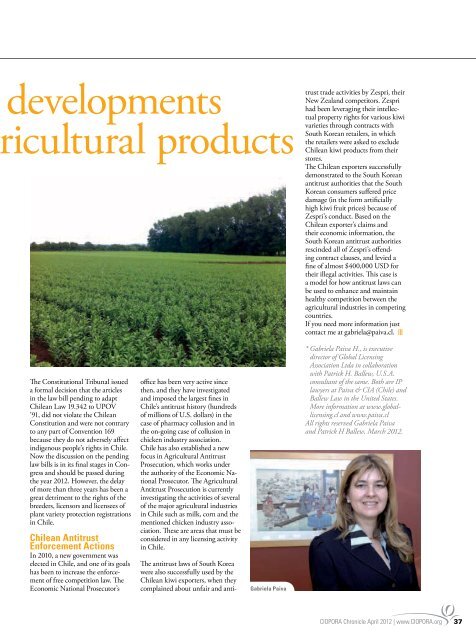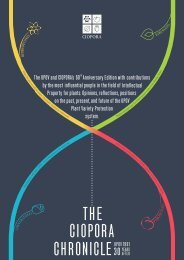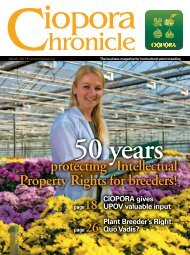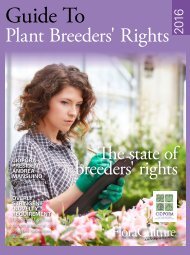2012 CIOPORA Chronicle
CIOPORA annual magazine on Intellectual Property protection for plant innovations 2012. The magazine was produced in cooperation with FloraCulture International. Read in the 2012 CIOPORA Chronicle edition: - Plant Patents in the United States after the America Invents Act - U.S. plant patents compared to UPOV PBR system - Does Belgian patent law need a breeder’s exemption? - How much open access can breeders afford? - IPP and PBR in Chile - IP protection for plant innovations in Canada and much more...
CIOPORA annual magazine on Intellectual Property protection for plant innovations 2012. The magazine was produced in cooperation with FloraCulture International.
Read in the 2012 CIOPORA Chronicle edition:
- Plant Patents in the United States after the America Invents Act
- U.S. plant patents compared to UPOV PBR system
- Does Belgian patent law need a breeder’s exemption?
- How much open access can breeders afford?
- IPP and PBR in Chile
- IP protection for plant innovations in Canada
and much more...
Create successful ePaper yourself
Turn your PDF publications into a flip-book with our unique Google optimized e-Paper software.
developments<br />
icultural products<br />
trust trade activities by Zespri, their<br />
New Zealand competitors. Zespri<br />
had been leveraging their intellectual<br />
property rights for various kiwi<br />
varieties through contracts with<br />
South Korean retailers, in which<br />
the retailers were asked to exclude<br />
Chilean kiwi products from their<br />
stores.<br />
The Chilean exporters successfully<br />
demonstrated to the South Korean<br />
antitrust authorities that the South<br />
Korean consumers suffered price<br />
damage (in the form artificially<br />
high kiwi fruit prices) because of<br />
Zespri’s conduct. Based on the<br />
Chilean exporter’s claims and<br />
their economic information, the<br />
South Korean antitrust authorities<br />
rescinded all of Zespri’s offending<br />
contract clauses, and levied a<br />
fine of almost $400,000 USD for<br />
their illegal activities. This case is<br />
a model for how antitrust laws can<br />
be used to enhance and maintain<br />
healthy competition between the<br />
agricultural industries in competing<br />
countries.<br />
If you need more information just<br />
contact me at gabriela@paiva.cl. |||<br />
The Constitutional Tribunal issued<br />
a formal decision that the articles<br />
in the law bill pending to adapt<br />
Chilean Law 19.342 to UPOV<br />
’91, did not violate the Chilean<br />
Constitution and were not contrary<br />
to any part of Convention 169<br />
because they do not adversely affect<br />
indigenous people’s rights in Chile.<br />
Now the discussion on the pending<br />
law bills is in its final stages in Congress<br />
and should be passed during<br />
the year <strong>2012</strong>. However, the delay<br />
of more than three years has been a<br />
great detriment to the rights of the<br />
breeders, licensors and licensees of<br />
plant variety protection registrations<br />
in Chile.<br />
Chilean Antitrust<br />
Enforcement Actions<br />
In 2010, a new government was<br />
elected in Chile, and one of its goals<br />
has been to increase the enforcement<br />
of free competition law. The<br />
Economic National Prosecutor’s<br />
office has been very active since<br />
then, and they have investigated<br />
and imposed the largest fines in<br />
Chile’s antitrust history (hundreds<br />
of millions of U.S. dollars) in the<br />
case of pharmacy collusion and in<br />
the on-going case of collusion in<br />
chicken industry association.<br />
Chile has also established a new<br />
focus in Agricultural Antitrust<br />
Prosecution, which works under<br />
the authority of the Economic National<br />
Prosecutor. The Agricultural<br />
Antitrust Prosecution is currently<br />
investigating the activities of several<br />
of the major agricultural industries<br />
in Chile such as milk, corn and the<br />
mentioned chicken industry association.<br />
These are areas that must be<br />
considered in any licensing activity<br />
in Chile.<br />
The antitrust laws of South Korea<br />
were also successfully used by the<br />
Chilean kiwi exporters, when they<br />
complained about unfair and anti-<br />
Gabriela Paiva<br />
* Gabriela Paiva H., is executive<br />
director of Global Licensing<br />
Association Ltda in collaboration<br />
with Patrick H. Ballew, U.S.A.<br />
consultant of the same. Both are IP<br />
lawyers at Paiva & CIA (Chile) and<br />
Ballew Law in the United States.<br />
More information at www.globallicensing.cl<br />
and www.paiva.cl<br />
All rights reserved Gabriela Paiva<br />
and Patrick H Ballew, March <strong>2012</strong>.<br />
<strong>CIOPORA</strong> <strong>Chronicle</strong> April <strong>2012</strong> | www.<strong>CIOPORA</strong>.org 37









